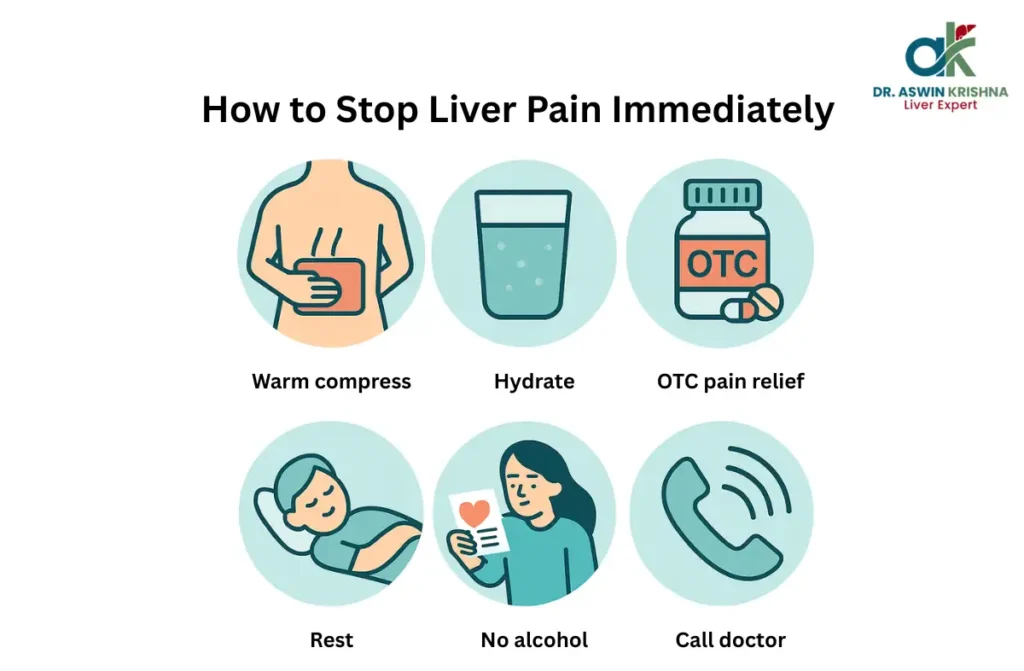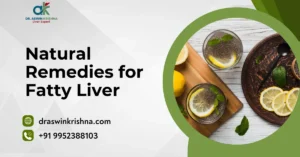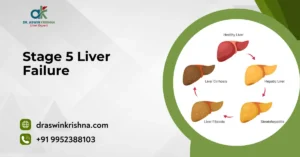Liver pain is not just a dull ache—it’s your body’s warning signal that something may be wrong with one of its most vital organs. Located in the upper right abdomen, this discomfort can range from mild to sharp, often affecting your daily activities. Whether it’s linked to fatty liver, hepatitis, or medication effects, knowing how to stop liver pain immediately can bring relief and prevent complications. Recognizing the cause early is the first step toward protecting your liver’s long-term health.
Where is Liver Pain Located?
Understanding where liver pain occurs is crucial for identifying the underlying issue and finding ways on how to stop liver pain immediately. The liver sits in the upper right side of your abdomen, just beneath the rib cage, and discomfort in this area can sometimes radiate to your back or right shoulder. Pinpointing the exact location can help you decide how to cure liver pain effectively and how to reduce liver pain before it worsens.
- Upper Right Abdominal Region – Most liver pain is felt just under the right ribcage. It can be a dull, persistent ache or a sharp stabbing sensation, depending on the cause. This pain may intensify with deep breathing or sudden movement.
- Radiating Discomfort to the Back or Shoulder – Liver pain can sometimes be misleading, radiating to the upper back or right shoulder blade. This referred pain occurs because the liver shares nerve pathways with nearby muscles and tissues.
- Tenderness Upon Touch – In some cases, pressing the right upper abdomen triggers noticeable tenderness. This symptom can indicate inflammation, swelling, or congestion in the liver that needs prompt attention.
Causes
Pinpointing liver pain causes is essential for proper management. Pain in this region can stem from mild inflammation to serious liver diseases. Recognizing the triggers helps determine if immediate care is needed and whether lifestyle changes or treatment can ease the discomfort.
- Fatty Liver Disease – One of the most common liver pain causes, fatty liver occurs when excess fat builds up in the liver cells. Many wonder, can fatty liver cause pain or does fatty liver cause pain? While early stages are often silent, advanced stages can lead to a heavy, aching sensation in the upper right abdomen.
- Hepatitis and Infections – Viral infections like hepatitis A, B, or C can cause swelling and irritation of the liver. This inflammation often results in pain, fatigue, and sometimes jaundice. Such cases require medical attention to prevent long-term damage.
- Liver Injury or Trauma – A direct blow to the right side of the abdomen can cause liver pain. Even minor injuries may lead to swelling or internal bleeding, making urgent medical evaluation necessary.
- Gallbladder-Related Issues – Since the gallbladder sits close to the liver, conditions like gallstones can trigger similar discomfort. These problems may overlap with liver pain causes, making diagnosis more challenging.
- Alcohol-Related Liver Damage – Prolonged alcohol consumption can inflame or scar the liver. In such cases, can fatty liver cause pain becomes a relevant question, as alcohol can worsen fat buildup and trigger discomfort.

Symptoms
Recognizing symptoms early is key to knowing how to stop liver pain immediately and preventing further complications. While liver pain is the main concern, other signs often appear alongside it, giving clues about the underlying cause.
- Persistent Upper Right Abdominal Ache – A constant, dull ache or pressure under the ribs on the right side is a primary indicator. In conditions like fatty liver stomach pain, the sensation can worsen after heavy meals or alcohol consumption.
- Radiating Pain to Back or Shoulder – Sometimes, liver pain doesn’t stay in one spot. It can travel to the right shoulder blade or upper back, creating confusion with muscle or joint issues.
- Swelling or Bloating – Liver inflammation can cause abdominal swelling, making the stomach feel tight or distended. This can be particularly noticeable when fatty liver stomach pain is present.
- Nausea and Loss of Appetite – Discomfort in the liver often disrupts digestion, leading to reduced appetite and feelings of queasiness, especially after eating fatty foods.
- Fatigue and Weakness – Liver issues can affect the body’s ability to filter toxins, leading to low energy levels and general tiredness that accompanies the physical pain.
How To Cope With Liver Pain Immediately?
When discomfort strikes, knowing how to stop liver pain immediately can help you manage symptoms while you address the root cause. These strategies can bring quick relief, whether you’re dealing with fatty liver stomach pain or other liver-related discomforts.
- Rest and Avoid Strenuous Activity – Give your liver a break by avoiding heavy lifting, intense workouts, or physically demanding tasks. Resting reduces internal pressure, allowing inflammation to subside and helping how to cure liver pain naturally.
- Apply a Heating Pad – Gentle heat applied to the upper right abdomen can soothe muscle tension and ease discomfort. This method works well when trying how to reduce liver pain caused by strain or mild inflammation.
- Over-the-Counter Pain Relievers – Medications like acetaminophen in small, safe doses can temporarily ease pain, but they must be used cautiously to avoid further liver stress. Always check dosage guidelines before use.
- Drink Plenty of Fluids – Hydration supports liver function by helping flush out toxins. Water, herbal teas, and clear broths can assist in reducing pain caused by dehydration-related strain on the liver.
- Avoid Fatty or Greasy Foods – Heavy, oily meals can worsen fatty liver stomach pain and slow recovery. Opt for light, nutrient-rich foods like vegetables, fruits, and lean proteins to support liver healing.
Treatment
Long-term relief goes beyond quick fixes. If you want to know how to stop liver pain immediately, addressing the underlying problem with the right treatment is essential. In many cases, medical evaluation is necessary, especially when fatty liver pain treatment is required.
- Medical Diagnosis and Targeted Therapy – Doctors may use blood tests, ultrasounds, or MRIs to confirm the cause of pain. For fatty liver pain treatment, lifestyle changes combined with prescribed medication can help reduce fat deposits and inflammation.
- Antiviral or Antibiotic Medication – If infections like hepatitis or bacterial inflammation are the cause, specific drugs are prescribed to control the infection and alleviate pain. This approach directly tackles the source of liver discomfort.
- Lifestyle Modifications – Reducing alcohol, improving diet, and engaging in moderate exercise can prevent recurring pain. For individuals with fatty liver, these changes are essential to stop the condition from progressing.
- Minimally Invasive Procedures – In cases where gallstones, cysts, or blockages are triggering pain, minor surgical or laparoscopic interventions can remove the source and restore normal liver function.
Natural Remedies
For those seeking gentler approaches on how to stop liver pain immediately, natural remedies can provide relief alongside medical care. These options are particularly useful for managing fatty liver stomach pain while supporting long-term liver health.
- Warm Herbal Teas – Teas made from ginger, chamomile, or peppermint can relax abdominal muscles and improve digestion, helping how to cure liver pain without harsh chemicals. Regular use can also reduce inflammation naturally.
- Turmeric and Milk Thistle – Both are known for their liver-protective properties. Turmeric’s curcumin content aids detoxification, while milk thistle can help how to reduce liver pain by improving liver cell repair.
- Balanced, Liver-Friendly Diet – Focus on whole grains, fresh vegetables, and antioxidant-rich fruits. This diet reduces fatty liver stomach pain by easing the digestive load and preventing further fat buildup in the liver.
- Hydration with Lemon Water – Drinking warm lemon water in the morning supports natural detoxification and helps flush out toxins that contribute to discomfort.
- Gentle Stretching and Breathing Exercises – Simple yoga poses and deep breathing can increase blood flow to the liver area, easing tension and promoting healing without strain.
Seriousness
Knowing when liver pain signals a serious condition is vital for timely intervention. While learning how to stop liver pain immediately can bring relief, some cases indicate urgent health concerns. Ignoring symptoms like fatty liver stomach pain can lead to long-term complications.
- Sudden, Intense Pain – A sharp and severe pain in the upper right abdomen could signal liver rupture, blocked bile ducts, or acute hepatitis. This requires immediate medical attention to prevent life-threatening outcomes.
- Yellowing of Skin or Eyes (Jaundice) – This occurs when bilirubin builds up in the blood, often due to impaired liver function. Alongside discomfort, it’s a strong indicator for how to cure liver pain through prompt medical care.
- Rapid Abdominal Swelling – Fluid accumulation (ascites) can cause extreme bloating and pressure, making it harder how to reduce liver pain. This may be linked to advanced liver disease or failure.
- Persistent Nausea and Vomiting – Continuous digestive distress, especially with fatty liver stomach pain, can indicate worsening inflammation or toxin buildup, requiring quick diagnosis and treatment.
Liver Pain from Cancer
Liver pain linked to cancer can be more persistent and intense than discomfort from other causes. Understanding how to manage it is crucial for those seeking how to stop liver pain immediately, especially when dealing with serious conditions.
- Deep, Constant Ache in Upper Abdomen – Liver cancer often causes a steady, gnawing pain that doesn’t ease with rest. This can be accompanied by tenderness and a feeling of fullness under the ribs.
- Unexplained Weight Loss and Fatigue – Alongside pain, significant weight loss and exhaustion can point toward advanced liver disease. In such cases, medicine for liver pain may be prescribed to manage discomfort while treatment targets the cancer.
- Enlarged Liver or Mass Detection – A noticeable swelling or lump in the upper right abdomen can indicate tumor growth. This may worsen fatty liver stomach pain and requires immediate medical evaluation to confirm diagnosis and start treatment.
Alcohol’s Effect
Alcohol consumption is one of the most common contributors to liver discomfort, particularly in those already experiencing fatty liver stomach pain. Understanding its impact is key to learning how to cure liver pain and how to reduce liver pain.
- Inflammation and Fat Buildup – Excessive drinking promotes fat accumulation in liver cells, leading to alcoholic fatty liver disease. This can trigger persistent discomfort and worsen existing fatty liver stomach pain.
- Progression to Severe Conditions – Continued alcohol use can advance from fatty liver to alcoholic hepatitis and eventually cirrhosis. At this stage, even small amounts of alcohol can intensify pain and damage.
- Interaction with Medications – Combining alcohol with certain medicine for liver pain can strain the liver further, slowing recovery and increasing the risk of liver toxicity. Avoiding alcohol completely is essential for effective healing.
When Should You Visit A Doctor?
While self-care methods can help in knowing how to stop liver pain immediately, certain warning signs mean it’s time to get professional help. Ignoring these symptoms can allow the condition to progress, making how to cure liver pain more difficult and delaying how to reduce liver pain.
- Pain Lasting More Than a Few Days – If discomfort persists or worsens despite rest and home remedies, it could indicate a deeper issue like hepatitis, gallstones, or liver inflammation that needs medical evaluation.
- Severe Fatigue or Weakness – Extreme tiredness, especially when combined with pain, may signal that the liver is struggling to process toxins efficiently and requires urgent attention.
- Signs of Jaundice – Yellowing of the skin or eyes often means the liver is not functioning properly. Alongside medicine for liver pain, diagnosis and targeted treatment are necessary to restore health.
- Sudden Swelling or Bruising – Rapid abdominal bloating, unexplained bruises, or bleeding issues can indicate advanced liver disease, making immediate intervention critical.
Conclusion
Liver pain is your body’s way of signaling that something needs attention. While learning how to stop liver pain immediately can bring short-term comfort, addressing the root cause ensures lasting relief and better liver health. Simple changes like improving your diet, staying hydrated, and avoiding alcohol can make a big difference. Listen to your body, act early, and give your liver the care it deserves for a healthier future.



